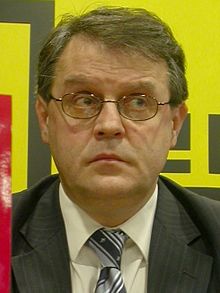Nebojša Čović
Небојша Човић

25 January 2001 – 3 March 2004
Zoran Živković
Acting
12 March 2003 – 16 March 2003
23 June 1994 – 21 February 1997
Belgrade, PR Serbia, FPR Yugoslavia
DA (1997–2004)
SDP (2004–2010)
Nebojša Čović (Serbian Cyrillic: Небојша Човић; born 2 July 1958) is a Serbian businessman, basketball executive, and politician. Since 2011, he has been serving as the president of Crvena zvezda mts Belgrade.
Early years and education
Čović was born in Belgrade, PR Serbia, FPR Yugoslavia, and graduated from the University of Belgrade's Faculty of Mechanical Engineering. In 2000, he obtained his PhD at the same university.[1]
Political career
In 1992, as a member of the Socialist Party of Serbia (SPS), 34-year-old Čović started his climb up the political ladder with a position of executive board vice-president in charge of economy and finances at the Belgrade city assembly.
A year later, in 1993, he advanced to the position of the city government president. In 1994 he got elected as the Mayor of Belgrade. In parallel, Čović was the SPS deputy (MP) in the Serbian National Assembly. Čović was sacked from the mayoral post in mid-January 1997 by the Serbian president and SPS party leader Slobodan Milošević amid the months-long protests in Serbia over the November 1996 municipal elections fraud.[2] He was expelled from SPS on the same occasion.
He became the president of Democratic Alternative (DA) after the party got formed by a certain number of SPS members seceded from SPS in July 1997.[3]
Čović served as the head of the Coordination Center for Kosovo and Metohija and as the head of the Southern Serbia Coordination Center during Preševo Valley conflict (1999–2001).[4]
From 24 October 2000 to 25 January 2001 he was a member of the trio Co-Prime Ministers together with Milomir Minić from SPS and Spasoje Krunić from the Serbian Renewal Movement (SPO) that transitionally governed Serbia after the Bulldozer Revolution, when Mirko Marjanović was sacked. After the assassination of Zoran Đinđić, he was the acting Prime Minister of Serbia from 12 to 16 March 2003.[5]
In 2004, his party Democratic Alternative merged into the Social Democratic Party (SDP). In 2005, he became president of the Social Democratic Party. The party ceased to exist in 2010.[6][7]
He was charged with corruption in January 2016.[8]
Sports administration career
FMP Železnik (1991–2011)
In 1991, Čović became involved with Serbian basketball club KK ILR Železnik, a dormant sports collective for workers of the state-owned Ivo Lola Ribar metallurgical factory.[9] Inactive since 1986, the club got revived by Čović under the auspices of his privately-owned metal products factory Fabrika metalnih proizvoda AD and renamed FMP Železnik. Under his guidance and ownership, the club grew into one of the top teams in Serbia and FR Yugoslavia.[1]
By 1993, the club got its own basketball facility – the 2,000-seat Železnik Hall that served as its home arena form then on. Climbing rapidly up the FR Yugoslavia basketball pyramid, FMP began the 1994–95 season in the Second Federal League, winning promotion to the country's top basketball competition for the following 1995–96 season.
In 1998, Čović brought former Yugoslav national team player Ratko Radovanović on board as the club's sporting director. Radovanović soon became synonymous with the emerging club, making player personnel decisions and running its day-to-day operations.[citation needed] Čović's son Filip later played as point guard for the club.
Yugoslav Basketball Federation (1995–1997)
In late 1995, while simultaneously performing the city of Belgrade mayoral job as well as Serbian National Assembly MP duties, Čović became president of the Yugoslav Basketball Federation (KSJ), succeeding Veselin Barović.[9] In addition to Čović's political connections through the SPS, the rapid success of his club FMP Železnik that was about to start competing in the country's top league that season after multiple promotions was the best possible recommendation for the job.
At the time when Čović came on board to lead the federation, FR Yugoslavia national team led by Duda Ivković were the reigning European champions, having returned to international competition following a four-year exile due to the UN embargo. Ivković soon stepped down and his assistant Željko Obradović took over the national team head coaching job. The national team had a great run at the 1996 Summer Olympics in Atlanta, reaching the final against the American Dream Team composed of NBA players. In early 1997, soon after Čović's fall from grace in SPS, he was removed from the KSJ job as well.[citation needed]
References
- ^ a b Bodrožić, Željko (2 February 2023). "Portret savremenika: Nebojša Čović". Vreme.
- ^ "Milosevic sacks mayors of Belgrade and Nis". CNN. 14 January 1997. Archived from the original on 19 January 2013.
- ^ "Nebojsa Covic, president of the Democratic Alternative and former mayor of Belgrade: Ms. Mira Markovic Annulled November 1996 Elections". EX-YU Press. 21 November 1998.
- ^ "Covic to stay at Kosovo Coordination Centre". B92.net. 26 February 2004.
- ^ "Serbian PM shot dead". 12 March 2003. Archived from the original on 26 August 2011.
- ^ "Povratak u politiku". vesti.rs. 31 May 2009.
- ^ "Politička scena bez Liberala Srbije, SDP-a i SLS-a". 26 January 2010.
- ^ "Optužnica protiv Nebojše Čovića dostavljena Specijalnom sudu". blic.rs. 18 January 2016.
- ^ a b "Nebojša Čović". biografija.org. 4 April 2019.
- v
- t
- e
- Founded in 1945
- Based in Belgrade, Serbia
- Ranko Žeravica Sports Hall (1968–1973)
- Aleksandar Nikolić Hall (1973–2023)
- Belgrade Arena (2013–2021; 2023–present)
- President: Nebojša Čović
- Honorary President: Vladimir Cvetković
- Presidency Member: Marko Kešelj
- Board Vice President: Saša Vlaisavljević
- Sporting Director: Milan Dozet
- Team Manager: Nebojša Ilić
- Head Coach: Ioannis Sfairopoulos
- Youth System Coordinator: Jovica Antonić
- U19 Head Coach: Branko Jorović
- U16 Head Coach: Miloš Šakota
- Youth system
- Ladies team
 Category
Category














